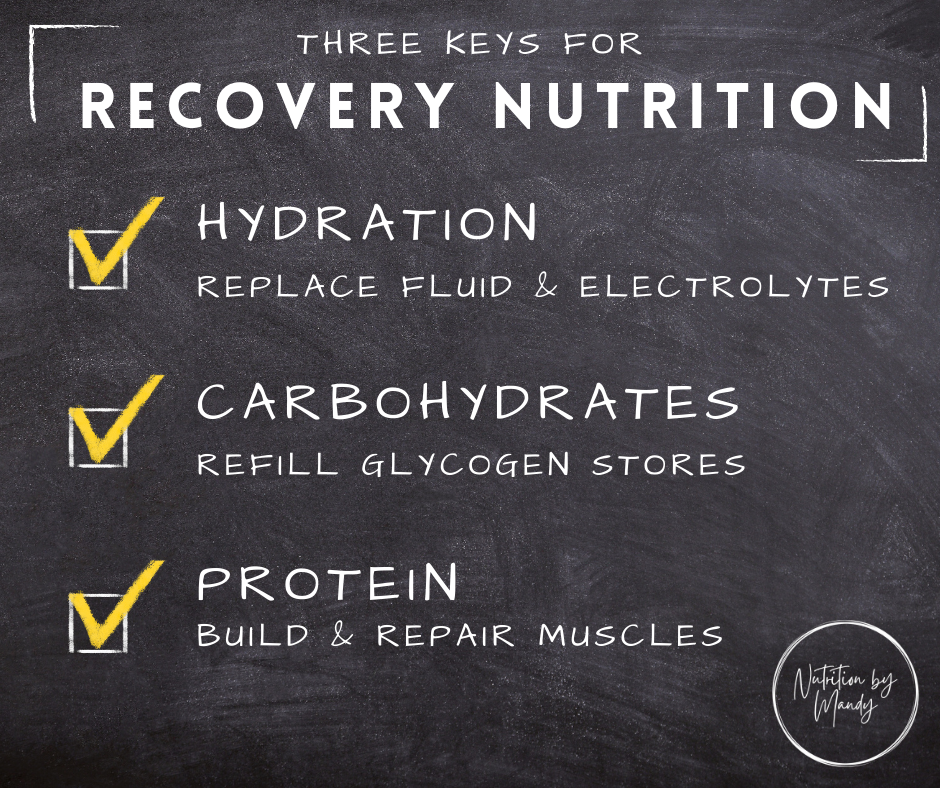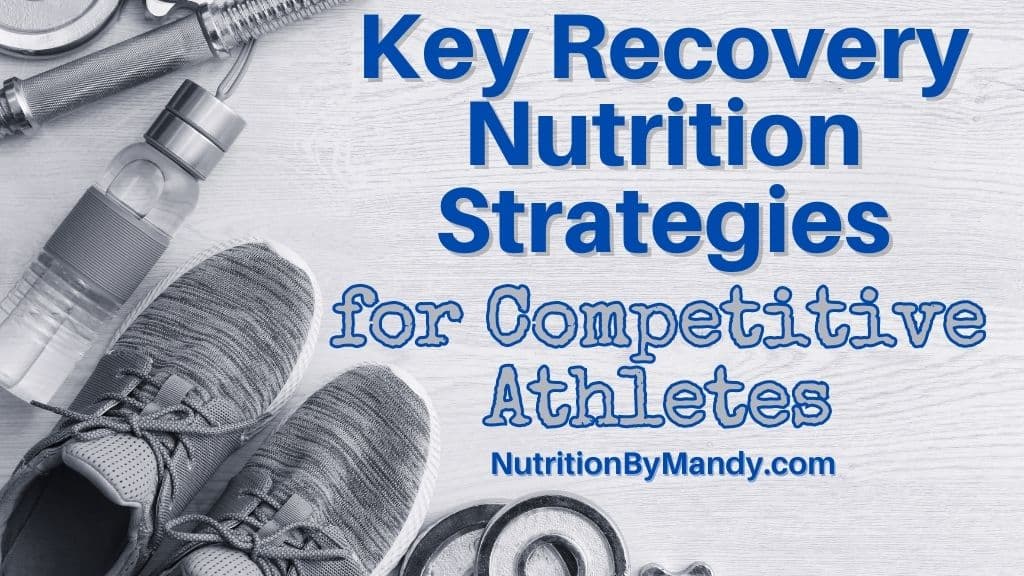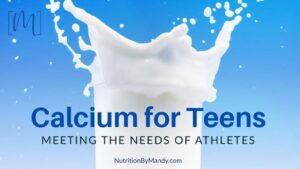Last Updated on December 14, 2025 by Mandy Tyler, M.Ed., RD, CSSD, LD
Key Recovery Nutrition Strategies for Competitive Athletes
Recovery nutrition is one area many athletes can quickly capitalize on to take their sports nutrition game plan to the next level.
Let’s take a look at why recovery nutrition is important for athletes. Then we will explore key recovery nutrition strategies for athletes to focus on.
Why is Recovery Nutrition Important for Athletes?
During activity, athletes deplete their bodies’ energy stores, lose fluid and electrolytes through sweat, and breakdown muscle tissue.
Thus, following activity, it is important for athletes to focus on consuming the right foods and drinks to support their bodies with recovering from the exercise session.
When Should Athletes Prioritize Recovery Nutrition?
Recovery nutrition is of particular importance when time between the training sessions or athletic competitions is limited (<24 hours). When athletes will be competing again the same day or the next, recovery nutrition should be a priority.
Examples of when athletes should make recovery nutrition a priority include:
- Tournament competitions
- Back-to-back games
- Double-headers
- Multiple training sessions in the same day (two-a-day workouts)
What Should Athletes Eat to Optimize Recovery from Activity?
Now that you understand why recovery nutrition is important, let’s take a look at the top recovery nutrition priorities for athletes.
What are the Top Priorities for Recovery Nutrition?
The goal of recovery nutrition for athletes is to replace the fuel and fluid used during the activity.
There are three key areas athletes should focus on when it comes to recovery nutrition.
- Fluid and Electrolytes: Rehydrate to replace fluid and electrolytes lost in sweat
- Carbohydrates: Refill energy stores (glycogen stores) used during the activity
- Protein: Build and repair muscles

Recovery Nutrition Hydration Needs for Athletes
Following a workout or competition it is important for athletes to rehydrate and replace the fluid and electrolytes lost in sweat.
Weighing before and after activity can help athletes determine how much fluid was lost in sweat.
To replace fluid lost in sweat, athletes need to drink more fluid (125%-150% more) than the amount lost in sweat. For each pound of weight lost during the activity, athletes should aim to drink 20-24 oz of fluid (1).
When athletes have limited time before their next game, replacing this fluid is especially important to ensure they start their next workout in a hydrated state.
Pro Tip: Make sure to check out my blog on recovery drinks for runners for ideas on rehydrating post-workout.

Replacing Electrolytes Following Activity
In addition to fluid, athletes lose electrolytes when they sweat. The main electrolyte lost in sweat is sodium.
Thus, following activity, athletes should focus on replacing sodium sweat losses.
Electrolytes with Post-Workout Meals and Snacks
Consuming sodium in food and drinks can help athletes with replacing the sodium lost in sweat. In addition, sodium helps stimulate thirst and helps the body to better retain the fluid consumed after exercise (2).
Consider adding salty foods to your recovery nutrition meals and snacks. Ideas include:
- Broth-based soup
- Pretzels, pita chips, snack crackers
- Deli meat, cheese, bread
- Cottage cheese
- Beef or turkey jerky
- Salted nuts and seeds
- Pickles, relish, capers, olives
- Condiments: Ketchup, barbecue sauce, mustard, soy sauce, salad dressing
- Vegetable juice
- Sports drinks
*Note: Talk with your doctor or a sports dietitian nutritionist about staying hydrated if you are required to limit your fluid or sodium intake.
Recovery Nutrition for Athletes: Refueling with Carbohydrates
During activity, athletes use their athletes use their carbohydrate (glycogen) stores to provide energy for their working muscles. As they exercise, the body’s stores of carbohydrates become depleted.
When athletes need to refuel quickly to prepare for the next exercise session, it is important to focus on replenishing these carbohydrate stores.
To optimize recovery, it is recommended that athletes consume 1-1.2 grams of carbohydrate per kilogram body weight for the first 4 hours after activity (1). For a 175-pound athlete, this would be 80 – 95 grams of carbohydrates.
Dietary Sources of Carbohydrates
There are a variety of ways athletes can meet their recovery nutrition carbohydrate needs. Dietary sources of carbohydrates include:
- Fruit: Fresh, frozen, dried, canned in natural juices, applesauce, fruit smoothies
- Starchy vegetables: Potatoes, sweet potatoes, corn, peas, beans, and legumes
- Grains: Bread, pasta, rice, cereal, oatmeal
- Dairy: Milk and yogurt
Pro Tip: By combining a variety of carbohydrate-rich foods in post-activity meals and snacks, athletes can easily meet their recovery nutrition needs.

Recovery Nutrition for Athletes: Build and Repair with Protein
When athletes exercise, they breakdown their muscles. Thus, including protein in recovery nutrition meals and snacks is important to support the repair and building-up of lean muscle mass.
Following activity, it is recommended athletes aim to consume ~0.25-0.3 grams of protein per kilogram body weight (1, 3). In general, this calculates to be in the range of 20-40 grams of protein, with larger athletes needing more protein than smaller athletes.
Meeting Recovery Nutrition Protein Needs with Food
Athletes can easily meet their recovery nutrition protein needs with real food. As a point of reference, the list below provides the amount of protein in commonly consumed foods.
- 1-ounce lean meat, pork, chicken, turkey, or fish: ~7 grams of protein
- 1 large egg: ~6 grams of protein
- 1 cup cottage cheese: ~28 grams of protein
- 1 cup Greek yogurt: ~21 grams of protein
- 1 cup low-fat milk: 8 grams of protein
- 1 cup ultra-filtered milk: 13 grams of protein
Pro Tip: Make sure to check out my blog to learn more about meeting the protein needs of athletes.

What About Protein Shakes to Meet Recovery Nutrition Needs?
Athletes often asked if recovery nutrition is best accomplished through a post-workout protein shake or through real food. As with many aspects of nutrition, this depends on the individual.
Some athletes are not hungry after a workout and find eating a meal to be a challenge. For these athletes, a post-workout shake may be a solution for meeting recovery nutrition needs.
If an athlete is considering the use of a protein powder it is important to select a high-quality product. Make sure to check out my blog, 5 Keys to Selecting the Best Protein Powder, for key considerations when purchasing protein powders.
Time and Convenience Considerations
Time may be another determining factor between a post-workout shake and a meal. Many high school and college athletes head straight to class after practice, thus there is not time to go to the cafeteria to eat a meal.
For these athletes, drinking a post-workout recovery shake or eating a well-planned snack can provide needed nutrients and hold them over until the next meal.
Adding Anti-Inflammatory Foods to Your Recovery Nutrition Meals and Snacks
When planning what to eat to support a quick recovery from activity, athletes should also focus on foods that can help reduce inflammation in the body.
In addition to a wide variety of fruits and vegetables, consider including the following anti-inflammatory foods in your recovery nutrition meals and snacks:
- Berries and cherries
- Tart cherry juice
- Leafy greens
- Fatty fish
- Nuts and seeds
- Avocados
- Olive oil
- Herbs and spices

Recovery Nutrition Snack and Meal Ideas
It is important to note that athletes can easily meet their recovery nutrition needs with real food.
The key lies in planning ahead to have the right foods available, at the right time, to support their recovery.
Pro Tip: Make sure to check out my blog on recovery foods for athletes for 10 of my top food choices for athletes to enjoy following a workout or competition.
Recovery Nutrition Snack Ideas
Consider the following recovery nutrition, post-game snack ideas:
- Low-fat chocolate milk and granola bars
- Peanut butter and jelly sandwich with low-fat milk
- Beef jerky, pretzels, banana, sports drink
- String cheese, sliced ham, crackers, orange wedges, low-fat milk
- Cottage cheese, pineapple, fig bars, 100% fruit juice
- Turkey and cheese wrap with sports drink
- Sports bar with sports drink
Recovery Nutrition Meals for Athletes
When possible, athletes should follow-up their recovery nutrition snack with a well-balanced meal within the next couple of hours.
Example post-game meals that can support athletes with meeting their recovery nutrition needs include:
- Burrito bowl with grilled chicken or steak, rice, black beans, corn salsa, lettuce, tomatoes, side tortilla, water
- Pasta with marinara sauce, sliced grilled chicken, salad, breadsticks, low-fat milk
- Grilled salmon, brown rice, steamed vegetables, fresh mixed berries, chicken noodle soup, tart cherry juice
- Roast beef sub sandwich, baked chips, grapes, sports drink
- Grilled chicken breast, baked sweet potato, green beans, sliced melon, dinner rolls, 100% fruit juice
Importance of Rest for Athlete Recovery
Finally, when discussing recovery from exercise, athletes should prioritize getting an adequate amount of quality sleep.
During sleep the body heals and repairs, which is essential for muscle growth and recovery from exercise sessions. Athletes should focus on creating positive sleep habits to help support getting a good night’s rest.
Tips for Promoting Optimal Sleep for Athlete Recovery
Ideas for promoting improved sleep for athletes include (4):
- Make the bedroom cool, dark, and quiet – like a cave
- Limit the use of electronics before bed
- Use the bed for sleeping only, not for studying or playing video games
- Create a consistent sleep routine by going to bed and getting up at the same time each day
- Develop a relaxing sleep routine, such as deep breathing, reading, journaling, or mindfulness exercises
Key Recovery Nutrition Strategies for Competitive Athletes
You are now set with ideas for how competitive athletes can meet their recovery nutrition needs.
If you desire an individualized sports nutrition plan, consider visiting with a sports dietitian nutritionist who can tailor a plan specific to your unique needs.
For additional sports nutrition tips, check out my blog: Your Guide to Game Day Nutrition.
Join the Nutrition By Mandy Email List & Get a Free Athlete’s Grocery List
Click HERE to join the Nutrition By Mandy e-mail list. When you join you will receive a free athlete’s grocery list to print and take with you to the store.
About the Author
Mandy Tyler is a Sports Dietitian Nutritionist in the San Antonio, TX area. She is a Registered and Licensed Dietitian, a Board-Certified Specialist in Sports Dietetics, a Licensed Athletic Trainer, and is a Certified Exercise Physiologist through the American College of Sports Medicine. Mandy has experience working with athletes at the high school, collegiate, and professional levels. She believes the key to reaching one’s full potential, both in everyday life and in sports performance, relies on a healthy nutritional foundation.

If you are looking to take your performance to the next level, make sure to check out my new Sports Nutrition Game Day Guide. This downloadable guide is written to help athletes develop an individualized plan to achieve peak performance on game day.





